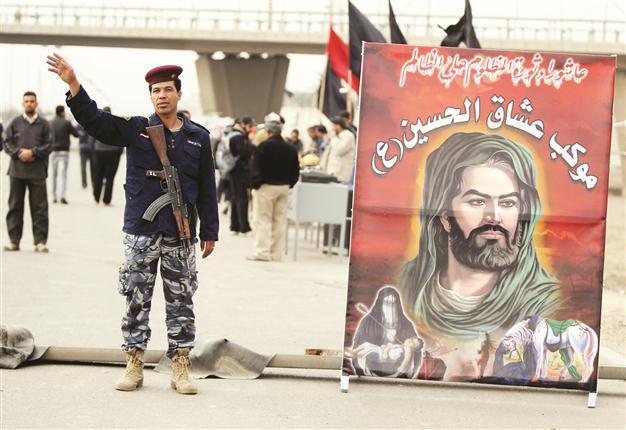Assaults fuel sectarian warfare threat in Iraq
BAGHDAD

An Iraqi policeman stands next to a religious portrait of Prophet Mohammed’s grandson Imam Hussein as Shiites walk on a main highway linking Baghdad to the central shrine city of Karbala. AFP photo
Attacks across
Iraq killed six people and wounded dozens of others yesterday, including 15
Afghan pilgrims visiting the country for religious commemorations, officials said. The violence included bombings of Shiite worshippers, 110 km south of Baghdad, as they walked to the shrine city of Karbala in preparation for Arbaeen rituals later this week.
Iraqi leaders are locked in a political standoff that began after the Shiite-dominated government called for Sunni Vice President Tariq al-Hashemi’s arrest on terrorism charges, as the last American troops pulled out last month. The standoff is at the heart of an ongoing political crisis, pitting the leaders of the country’s mostly ethnic and sectarian-based party blocs against each other. The U.S. and some Iraqi officials have warned of a resurgence of Sunni and Shiite militant activity following the U.S. troop withdrawal.
In Baghdad, gunmen burst into the home of Fatma Tayyiq, a branch manager for the Commercial Bank of Iraq, and shot her and husband dead in the capital’s central Karrada district, an Interior Ministry official said. Just south of Baghdad in the town of Owairij, a roadside bomb targeting devotees walking to Karbala killed one pilgrim and wounded at least nine others, Defense and Interior Ministry officials said. In the northern ethnically-mixed city of Kirkuk, meanwhile, a gunman opened fire on a group of security officers from semi-autonomous northern Iraq, killing two officers and wounding two others, a police officer in the city told Agence-France Presse. The gunman was killed in return fire, he added.
In the former insurgent bastion of
Fallujah, west of Baghdad, a roadside bomb killed one Iraqi soldier and wounded three others, Army Lt. Col. Yassin Mohammed said. And on the outskirts of the central city of Hilla, a car bomb wounded 15 Afghan pilgrims, three of them seriously, according to police and medics.
Al-Hashemi stays in Iraq
The festival of Arbaeen later this month marks 40 days after the Ashura anniversary commemorating the killing of Imam Hussein, one of Shiite Islam’s most revered figures, by the armies of the Caliph Yazid in 680. As part of the ceremonies, Shiite pilgrims walk to Karbala from across Iraq. Attacks on
Shiites in the capital and southern Iraq on Jan. 5 killed more than 70 people and wounded more than 100, the highest death toll since August 2011.
Meanwhile, Iraq Vice President Tariq al-Hashemi, who is currently in northern Iraq upon the authorities’ decision to issue an arrest warrant for him on terror charges, said he will remain in Iraq and will solve the crisis there, thanking Turkey for its invitation. “Turkey is Sunni. We [Iraq] are Sunni. Turkey is accused of everything done by the Iraqi Sunnis. But we are taking our decision with full independence, and Turkey has never given us any opinion on any issue,” al-Hashemi told daily Türkiye yesterday. He said Turkey had helped Iraq in its bad times, saying he is in northern Iraq on official duty as instructed by Iraq President Jalal Talabani. Al-Hashemi said he will not return to Bagdad until the judiciary becomes fully independent.
